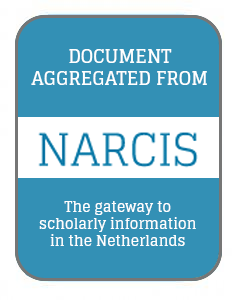Focal point
Location
National Academic Research and Collaborations Information System (NARCIS) is the main Dutch national portal for those looking for information about researchers and their work. NARCIS aggregates data from around 30 institutional repositories. Besides researchers, NARCIS is also used by students, journalists and people working in educational and government institutions as well as the business sector.
NARCIS provides access to scientific information, including (open access) publications from the repositories of all the Dutch universities, KNAW, NWO and a number of research institutes, datasets from some data archives as well as descriptions of research projects, researchers and research institutes.
This means that NARCIS cannot be used as an entry point to access complete overviews of publications of researchers (yet). However, there are more institutions that make all their scientific publications accessible via NARCIS. By doing so, it will become possible to create much more complete publication lists of researchers.
In 2004, the development of NARCIS started as a cooperation project of KNAW Research Information, NWO, VSNU and METIS, as part of the development of services within the DARE programme of SURFfoundation. This project resulted in the NARCIS portal, in which the DAREnet service was incorporated in January 2007. NARCIS has been part of DANS since 2011.
DANS - Data Archiving and Networked Services - is the Netherlands Institute for permanent access to digital research resources. DANS encourages researchers to make their digital research data and related outputs Findable, Accessible, Interoperable and Reusable.
Members:
Resources
Displaying 141 - 145 of 1863Land reform revisited: democracy, state making and agrarian transformation in post-apartheid South Africa
Revisiting South Africa's land and agrarian questions / Grasian Mkodzongi and Femke Brandt -- Broadening conceptions of democracy and citizenship : the subaltern histories of rural resistance in Mpondoland and Marikana / Sarah Bruchhausen and Camalita Naicker -- From material to cultural : historiographic approaches to the Eastern Cape's agrarian past / Elene Cloete -- South Africa's dangerous game : re-configuring power and belonging on Karoo trophy-hunting farms / Femke Brandt -- Gendered nationhood and the land question in South Africa 20 years after democracy / Kezia Batisai -- Farm wor
Land Use Conflicts in the Energy Transition: Dutch Dilemmas
The transition from fossil to renewable energy needs changes in land use. The development of renewable energy sources introduce extra and sometimes new externalities, such as shadows and noise on landscape. There are governments who are experiencing difficulties when developing renewable energy sources especially when existing land owners (and others) start anticipating on those externalities. Therewith, land use conflicts have become a major issue for governments in meeting renewable energy policy objectives.
Analyses of land cover change trajectories leading to tropical forest loss : Illustrated for the West Kutai and MahakamUlu Districts, East Kalimantan, Indonesia
In Indonesia, land cover change for agriculture and mining is threatening tropical forests, biodiversity and ecosystem services. However, land cover change is highly dynamic and complex and varies over time and space. In this study, we combined Landsat-based land cover (change) mapping, pixel-to-pixel cross tabulations and expert knowledge to analyze land cover change and forest loss in the West Kutai and Mahakam Ulu districts in East Kalimantan from 1990-2009.
Bouwen aan vertrouwen: woningbouwprogrammering aan de vooravond van de omgevingswet : eindrapport PROSPER-onderzoek
Spatial Data Structure and Functionalities for 3D Land Management System Implementation: Israel Case Study
With the existence of mature technologies and modern urban planning necessities, there is a growing public demand to improve the efficiency and transparency of government administrations. This includes the formation of a comprehensive modern spatial land management (cadastre) system having the capacity to handle various types of data in a uniform way—above-terrain and below-terrain—enabling the utilization of land and space for various complex entities.



